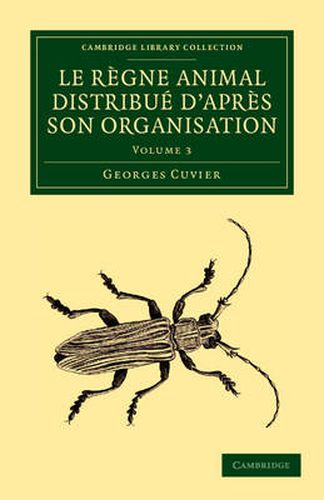Readings Newsletter
Become a Readings Member to make your shopping experience even easier.
Sign in or sign up for free!
You’re not far away from qualifying for FREE standard shipping within Australia
You’ve qualified for FREE standard shipping within Australia
The cart is loading…






French zoologist and naturalist Georges Cuvier (1769-1832), one of the most eminent scientific figures of the early nineteenth century, is best known for laying the foundations of comparative anatomy and palaeontology. He spent his lifetime studying the anatomy of animals, and broke new ground by comparing living and fossil specimens - many he uncovered himself. However, Cuvier always opposed evolutionary theories and was during his day the foremost proponent of catastrophism, a doctrine contending that geological changes were caused by sudden cataclysms. He received universal acclaim when he published his monumental Le regne animal, which made significant advances over the Linnaean taxonomic system of classification and arranged animals into four large groups. The sixteen-volume English translation and expansion, The Animal Kingdom (1827-35), is also reissued in the Cambridge Library Collection. First published in 1817, Volume 3 of the original version covers molluscs, arachnids and insects.
$9.00 standard shipping within Australia
FREE standard shipping within Australia for orders over $100.00
Express & International shipping calculated at checkout
Stock availability can be subject to change without notice. We recommend calling the shop or contacting our online team to check availability of low stock items. Please see our Shopping Online page for more details.
French zoologist and naturalist Georges Cuvier (1769-1832), one of the most eminent scientific figures of the early nineteenth century, is best known for laying the foundations of comparative anatomy and palaeontology. He spent his lifetime studying the anatomy of animals, and broke new ground by comparing living and fossil specimens - many he uncovered himself. However, Cuvier always opposed evolutionary theories and was during his day the foremost proponent of catastrophism, a doctrine contending that geological changes were caused by sudden cataclysms. He received universal acclaim when he published his monumental Le regne animal, which made significant advances over the Linnaean taxonomic system of classification and arranged animals into four large groups. The sixteen-volume English translation and expansion, The Animal Kingdom (1827-35), is also reissued in the Cambridge Library Collection. First published in 1817, Volume 3 of the original version covers molluscs, arachnids and insects.